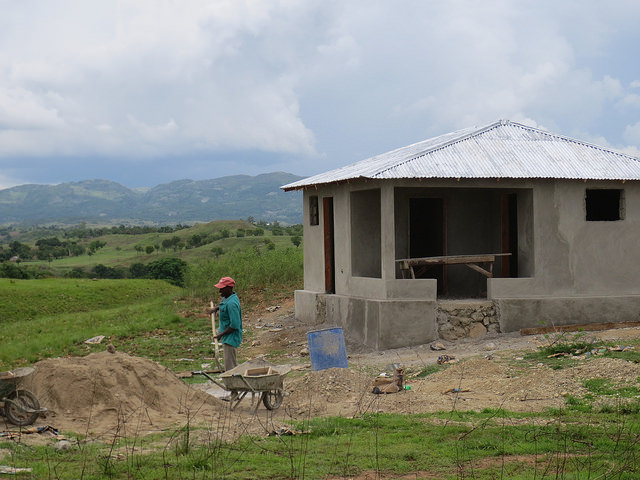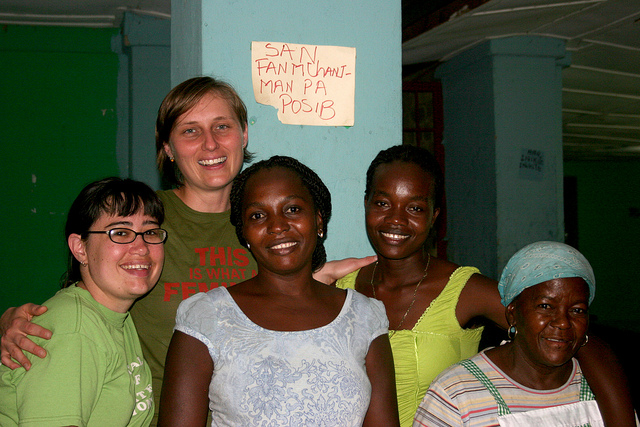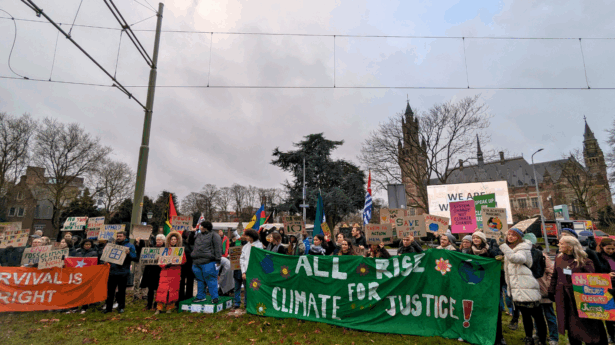The Unitarian Universalist Service Committee advances human rights through grassroots collaborations.
Village, Community, Movement
July 3, 2014
Reflections on the Haiti Eco-Villages
When I tell people I’ve been to Haiti, their voices often shift to a register of sadness and pity. They say, “Oh, it’s so sad, the situation there.” They say, “Is there really any good that can be done?” This always disorients me. I know the people of Haiti face huge challenges, but overwhelmingly my experience of the country and its people is one of hope, of strength, of transformation.
Three years ago, fellow UUSC-UUA service-learning participants and I worked with the Papaye Peasant Movement (MPP) to lay the foundation of the first house of the first eco-village, a joint project of UUSC and MPP, in the country’s rural Central Plateau. When I returned this past May on a journey with the UU College of Social Justice, I was heartened by the progress and was fired up once again by the fierce commitment to justice of the social movement these villages are rooted in.
Physical progress
 The most tangible signs of progress in the eco-villages are physical: sturdy homes, flourishing gardens, growing tree nurseries, solar power setups, community gathering spaces. Where there was once just a lone house foundation, there are now complete villages — MPP was nearing completion of the sixth eco-village in May as we helped sift sand, move rocks, and hand lumber to skilled roofers.
The most tangible signs of progress in the eco-villages are physical: sturdy homes, flourishing gardens, growing tree nurseries, solar power setups, community gathering spaces. Where there was once just a lone house foundation, there are now complete villages — MPP was nearing completion of the sixth eco-village in May as we helped sift sand, move rocks, and hand lumber to skilled roofers.
Each village is home to 10 families who have started new lives as small farmers after being displaced from Port-au-Prince by the 2010 earthquake. With six villages — two made possible by UUSC and the other four funded by the Presbyterian Disaster Assistance — in place, 60 families have shelter and the means to feed themselves and generate sustainable livelihoods.
One of the most exciting things about this project is that it establishes a successful holistic model that can be replicated throughout the countryside. And it’s a model that puts power squarely in the hands of the peasants — a word that MPP members have reclaimed for themselves as small rural farmers. As Philfrant St. Naré, manager of MPP’s community animators (MPP’s version of community organizers), told us, “We want peasants to have control over what they produce. We want to build a government that takes care of peasants and everyone else, too. We want to build a Haiti that is self-sufficient.”
Sovereignty and sustainability
Sovereignty and environmental sustainability are bedrock principles embedded in everything that MPP does — and it starts with food. “I can spend a week in the same clothes, but I can’t go a week without food,” says Paul Muler, the MPP agronomist and community animator who was our main host this past trip. That is why MPP is, at its core, a collection of farming cooperatives called gwoupman, all of which receive support and training from MPP agronomists. MPP’s approach is “agriculture that respects the earth, the air, and the people,” as Muler says, and they use organic, sustainable farming methods.
After the 2010 earthquake, along with the influx of international assistance came the advice and directives for recovery. When UUSC began working with MPP in 2010, it approached the grassroots group as an eye-to-eye partner. As St. Naré, who has worked with MPP for 25 years, said to us, “NGOs need to ask what we need and not tell us what we need. Instead of giving us food, help us produce our own food.” Aware of the importance of Haitians leading the recovery in ways that support their own vision, UUSC asked questions, listened to the answers, and helped MPP hone plans for how they would like to move forward and support families in the wake of the earthquake — and that’s how the first eco-village was born.
Community power
The eco-villages are about more than farming and food, though; they are about community connections and power, about social change, about justice. This was driven home to me over and over again as we spoke with MPP members. MPP traces the connections between the many forms of oppression experienced in Haiti.
“You can’t be free if the person next to you isn’t free,” Muler reminded us. MPP was founded more than 40 years ago — it now counts a nationwide membership of more than 60,000 — and has been living this concept out each step along the way. As they recognize the ways that a history of slavery, occupation, and international interference has disempowered their nation, they recognize the ways that ruling elites in Port-au-Prince have disenfranchised the peasants in the countryside.
Women’s equality
 MPP also recognizes the ways that women have been oppressed, and empowering women is integral to the changes MPP is working to make reality. “To fight the exploitation that men and women experience, we must first fight men’s domination of women,” St. Naré told us. Article 13 of MPP’s bylaws prioritizes equality between men and women.
MPP also recognizes the ways that women have been oppressed, and empowering women is integral to the changes MPP is working to make reality. “To fight the exploitation that men and women experience, we must first fight men’s domination of women,” St. Naré told us. Article 13 of MPP’s bylaws prioritizes equality between men and women.
MPP’s commitment to gender equity shows up in so many ways: their zero-tolerance policy for domestic violence among their members, their prioritization of education for girls and adult literacy for women, and their understanding of the link between education and economic empowerment for a brighter future for girls and women. Women serve in a variety of MPP roles, from doctors to agronomists to the director of their cooperative bank.
Giselaine Saint Fleur, an animator and the coordinator of MPP’s 2,000 women’s gwoupman, shared: “My wish for all women is that we be able to take our destiny in our own hands.” The same could be said about MPP’s wish for all peasants, for all Haitians.
Power, strength, and resilience
So when people say to me, “Oh, it’s so sad, the situation there,” I say: “The challenges that Haiti faces are big and hard and sad — but to leave it at that ignores the strength of Haitians who are actively surviving, actively creating positive change, actively making progress.”
When people say to me, “Is there really any good that can be done?” I say: “Absolutely. There is so much good that already is being done — and is being led by the Haitian people. And we have an important role to play in supporting their vision and moving it forward.”
Then I continue: I tell them about MPP, about Muler, about St. Naré, about Saint Fleur. I tell them about Chavannes Jean-Baptiste, the founder of MPP. I tell them about the song, “Ann Makonnen Fos Nou” (“Let’s Intertwine Our Strengths Together”), that Muler taught us during this last trip. I tell them about the green peppers growing in container gardens and the fresh mangoes. I tell them about the soil I mixed according to the agronomist’s directions (three parts soil, two parts manure, one part sand) and poured into small bags to grow tree saplings; I handed them off to Cassandra, a resident of the second village who we worked alongside at the on-site tree nursery there. I tell them about power, strength, and resilience — of the people I met, of the communities I worked in, of the movement I witnessed.

